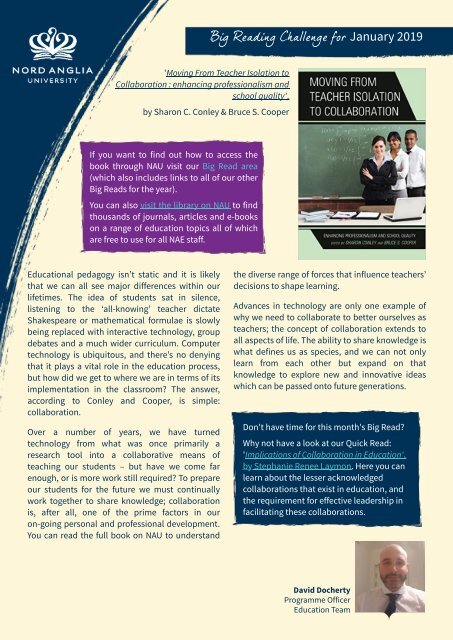Connect-ed+Issue+46+January+2019
You also want an ePaper? Increase the reach of your titles
YUMPU automatically turns print PDFs into web optimized ePapers that Google loves.
Big Reading Challenge for January 2019<br />
'Moving From Teacher Isolation to<br />
Collaboration : enhancing professionalism and<br />
school quality',<br />
by Sharon C. Conley & Bruce S. Cooper<br />
If you want to find out how to access the<br />
book through NAU visit our Big Read area<br />
(which also includes links to all of our other<br />
Big Reads for the year).<br />
You can also visit the library on NAU to find<br />
thousands of journals, articles and e-books<br />
on a range of education topics all of which<br />
are free to use for all NAE staff.<br />
Educational pedagogy isn?t static and it is likely<br />
that we can all see major differences within our<br />
lifetimes. The idea of students sat in silence,<br />
listening to the ?all-knowing? teacher dictate<br />
Shakespeare or mathematical formulae is slowly<br />
being replaced with interactive technology, group<br />
debates and a much wider curriculum. Computer<br />
technology is ubiquitous, and there?s no denying<br />
that it plays a vital role in the education process,<br />
but how did we get to where we are in terms of its<br />
implementation in the classroom? The answer,<br />
according to Conley and Cooper, is simple:<br />
collaboration.<br />
Over a number of years, we have turned<br />
technology from what was once primarily a<br />
research tool into a collaborative means of<br />
teaching our students ? but have we come far<br />
enough, or is more work still required? To prepare<br />
our students for the future we must continually<br />
work together to share knowledge; collaboration<br />
is, after all, one of the prime factors in our<br />
on-going personal and professional development.<br />
You can read the full book on NAU to understand<br />
the diverse range of forces that influence teachers?<br />
decisions to shape learning.<br />
Advances in technology are only one example of<br />
why we need to collaborate to better ourselves as<br />
teachers; the concept of collaboration extends to<br />
all aspects of life. The ability to share knowledge is<br />
what defines us as species, and we can not only<br />
learn from each other but expand on that<br />
knowledge to explore new and innovative ideas<br />
which can be passed onto future generations.<br />
Don't have time for this month's Big Read?<br />
Why not have a look at our Quick Read:<br />
'Implications of Collaboration in Education',<br />
by Stephanie Renee Laymon. Here you can<br />
learn about the lesser acknowledged<br />
collaborations that exist in education, and<br />
the requirement for effective leadership in<br />
facilitating these collaborations.<br />
David Docherty<br />
Programme Officer<br />
Education Team


